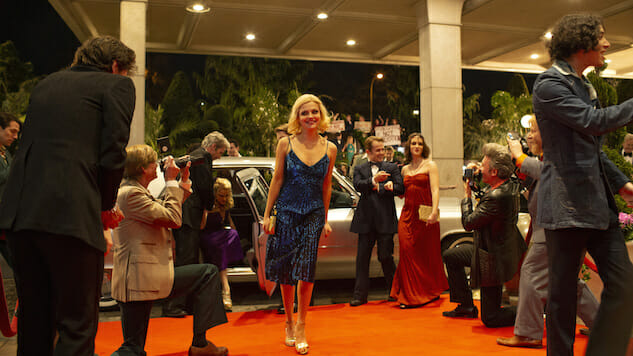The Deuce Attends the Oscars of Porn in the Terrific “Seven-Fifty”
(Episode 2.03)
Photo: Paul Schiraldi/HBO TV Reviews The Deuce
No matter how good things seem, if you’re entwined in a corrupt industry (which is all of them, as far as The Deuce is concerned), someone’s always ready to exploit, undercut, and climb right over you. The Deuce may be about its characters, but its characters (and “Seven-Fifty”) are about business.
It’s about the ways we can lose ourselves in our careers and how making business into pleasure (and, in the case of most denizens of the Deuce, vice versa) is a dangerous proposition. Sometimes that danger is physical and real, caught up in protection rackets, as when Paul (Chris Coy) finally solidifies his plan for a mob-free follow-up establishment catering to the LGBTQ clientele. Sometimes the danger manifests as loyalty-devouring cowardice, as when Vincent (James Franco) rats on Paul’s endeavor so his own disco remains secure.
More often, though, the show leers at ambition with the cynical gaze of someone who’s put themselves out there and failed. Writer Chris Yakaitis chisels all these angles into a single elegant episode with one event at its brittle, bitter core: the AFFA Erotic Awards.
Eileen (Maggie Gyllenhaal, whose height is perfectly framed in her scenes) and Harvey (David Krumholtz) are the MVP buds of the year—the rapport between the two actors is worthy of a “True Detective Season Four” meme—as they support Lori (Emily Meade) in L.A. after she and Harvey receive nominations from the adult film association. C.C. (Gary Carr) being scared of planes, they leave the pimps behind and strut towards the promised land of every starry-eyed hopeful.
The scene in which Lori arrives at a nice hotel room for the first time is a crucial grounding point. Who hasn’t been there, embracing a small luxury after years of struggle? Maybe we weren’t all sex workers, with its added association with grubby motel rooms, but the scene makes the moment feel universal. Meade is wonderful, but the way it’s shot means she doesn’t have to be. Director Steph Green’s camera follows her appreciative hands, evoking the warm, fibrous texture of terrycloth robes and plush pillows, as Meade’s eyes eat up the room and—opening the balcony door—sunny, breezy L.A. There’s doubt in her face (why would I ever get anything good?), but the allure of the city has never been more tangible.
This all seems too good to be true. Somehow, everyone wins and everyone is cool in the porn industry. Somehow. Even the weird, dead-eyed actor explaining “DP” to Larry (Gbenga Akinnagbe) back in NYC seems nice enough, even if it’s something much dirtier than “director of photography.” Everything’s great until Eileen schmoozes and shops her fairy tale idea around. Ok, so maybe an industry built on the commodification of the female body isn’t ready for… well, even a glimpse of gender equity. When Eileen has to make a choice, it’s a gripping professional decision heavy with moral compromise, modern resonance, and utter betrayal. The brief shot of Gyllenhaal’s eyes as she considers the proposal—one that would allow her to move towards her dreams—is a moment so complex that understanding her facial movements requires navigating the entirety of her character’s history and motivations. It’s amazing and wrenching.
This idea of underprivileged groups being, to be thematically vulgar, DP’d by discrimination and economics (one systemically reinforcing the other), applies to both female stars and any would-be black ones. As Larry finds, you get equal-opportunity screwed if you’re not a white dude—even in the sex business. Nowhere is that made more clear than when things continue going well for that son-of-a-bitch Frankie (Franco). He’s still looting his workplace, somehow using his skimming to win a laundromat in a game of cards, though the more fun moment for his storyline is when Irene (Roberta Colindrez, breaking out this season) mocks Franco’s runaway machismo.
The episode still has its tired parts—the stilted water-treading with Chris Alston (Lawrence Gilliard Jr.) and the mayor’s Times Square initiative is barely keeping its head above water—but some real emotional resonance from all other corners keep things moving. Two great jokes—a Puerto Rico gag and a vicious Westworld burn—counteract some of the wanton and sloppy celeb-spotting in the background. Ron Jeremy, John Belushi, who gives a damn? We’re here for Eileen and the luscious sets, not the name-dropped extra the series wastes its focus on. That nonsense and everything with Bobby (Chris Bauer) aside, the mob subplot is heating up (ha ha) with some killer deadpan from consigliere Tommy (Daniel Sauli), as is the tension between the pimps and their workers.
The emasculated, outdated regime of fear is being attacked from both ends, with porn coming for their money and social workers—and Abby (Margarita Levieva)—coming for their laborers. Personifying the absolute rock-bottom depths of becoming your job is Jamie Neumann’s Ashley: She’s escaped C.C. and returned to help others like her, but the white-knuckle, teeth-grinding staredown between the two is a hell of a scene, amped up by the two performers. Carr’s malevolent presence and Neumann’s phantom-like stoicism communicates lasting fear and toxicity without hardly saying a word. Getting out of The Deuce’s soul-selling business never leaves you without scars.
Jacob Oller is a writer and film critic whose writing has appeared in The Guardian, Playboy, Roger Ebert, Film School Rejects, Chicagoist, Vague Visages, and other publications. He lives in Chicago, plays Dungeons and Dragons, and struggles not to kill his two cats daily. You can follow him on Twitter here: @jacoboller.